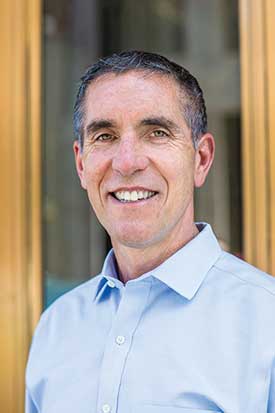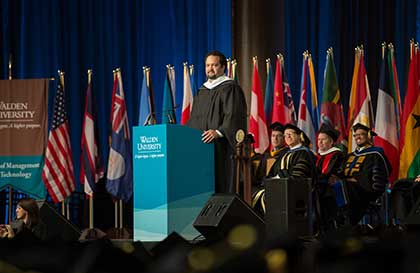
In January, an old friend reached out to me for help. Benjamin Jealous, a partner at Kapor Capital and the former president and CEO of the NAACP, was looking to me for some inspiration as he finished the winter 2017 commencement address he would be giving to many of you in a few short days. I knew exactly what to tell him.
Prior to enrolling at Walden, I had worked overseas and raised three children. As my kids were growing up and going off to college, I decided to come back from abroad, but I was still unsure what to do next. I’d always been deeply involved in social enterprise and impact investing, but I needed to figure out how to pull all these pieces together in my next chapter. I didn’t really need any more career help—I came to Walden strictly out of intellectual curiosity.
My Walden experience was much different from what I expected.
It was by far the most diverse educational environment I’ve ever been in. In my time at Walden, I can tell you what I found: A large number of African-Americans, an equal number of veterans, a majority of parents, lots of folks from overseas. Every single student I met was motivated by a passion for social justice. I met a crosssection of America—and of the world—that I hadn’t expected.
It turns out Walden is for people who share the same sensibilities as me, but come from backgrounds very different from mine. My classmates were not the children of elites; they were the offspring of middle America, the South, flyover country—all striving to learn, to grow, and to make something better of themselves and of society.
As an online university, Walden offers working people a way to get advanced degrees. These folks have to work really, really hard to stay in school. It's not expensive compared to a year at Yale, but it's very expensive in terms of time and commitment.
Walden takes real grit, real determination, and real courage to stick it out to get an advanced degree. Many folks fall—and get back up again. I thought I had to work hard to get my PhD, but not compared to my classmate with a kid in prison who was caring for elderly parents on one income in Biloxi, Mississippi.
For my colleagues, social justice is not an abstract element that would be nice to have; it’s the essence of how their communities will succeed. They see themselves as models (as do I for my kids and my staff at The Dream Corps) and believe there is nothing you cannot achieve if you put your mind to it.
During my final months in the doctoral program, I had lunch with activist, attorney, author, commentator, and regular CNN contributor Van Jones. As the co-founder of The Dream Corps, Jones wanted to discuss the possibility of me joining the social justice accelerator as its CEO. I knew this was a way to make a massive contribution to America and to people like those classmates of mine who were working to make their own dreams come true.

I was a volunteer with the Peace Corps in the 1980s, and to this day, I meet Peace Corps volunteers who are bringing those experiences to the workplace. The same is true of my colleagues at Walden.
I found my Walden classmates to be very sophisticated and nuanced in their ways of looking at the world. They’re captivating individuals. I expect that soon, agencies, companies, and nonprofits across the country will have people working for them with the ideological foundation instilled in them at Walden. Walden graduates are going to improve society at all levels.
It’s so deeply embedded in the Walden DNA to work toward social justice, and that dovetails so nicely with my work at The Dream Corps. Having people who are informed by a strong sense of what’s right and being able to stand up for classic American values of justice and fairness is incredibly important right now. People are going to carry that foundation with them for the rest of their lives. That’s how Walden is making a difference, how Walden makes all this possible.
Dr. John Anner ’16 is a PhD in Public Policy and Administration graduate and the CEO of The Dream Corps, a social justice accelerator founded in 2014 by Van Jones. Anner has been working in social justice and international development since the late 1970s. From 2003 to 2015, Anner led Thrive Networks, an international development agency implementing large-scale projects in healthcare, education, and clean water across Asia and Africa. He was also the founder and executive director of the Independent Press Association, a membership organization of social justice periodicals, from 1996 to 2003.



